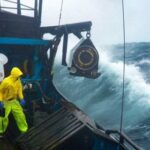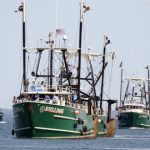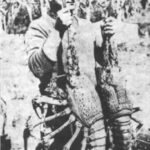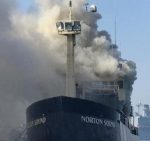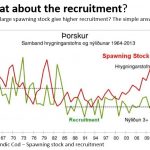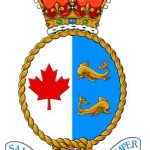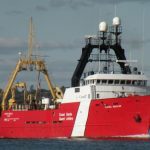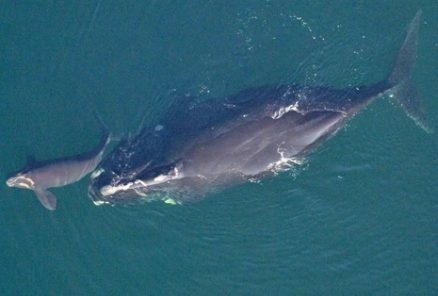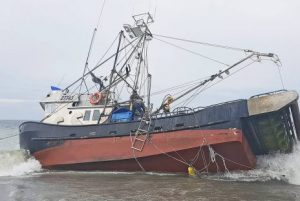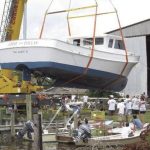Tag Archives: Frank Mirarchi
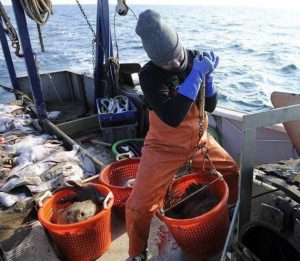
‘There’s no margin’ – Monitors final nail in coffin Feds propose up to 100% fish-counting, unclear on who’s on hook for costs
Groundfishermen, speaking Wednesday afternoon during the public comment period, drew a straight line from the increased monitoring costs to the economic collapse of the fishery. “I made 124 trips last year and each day was 10-14 hours,” said Gloucester fisherman Joe Orlando. “At $700 a day for 100% monitoring, that comes to $84,000 for the year. I didn’t even come close to making that. It would completely bankrupt the sector. And there’s only a handful of us left.” >click to read< 19:45
Scituate’s tribute to fishermen should be wake-up call of industry’s troubles
 It is often said, “All politics is local;” a phrase that is often associated with former Speaker of the House from Massachusetts Tip O’Neil. The phrase is appropriate for the re-dedication of the Scituate town pier on Friday, June 24. The event, hosted by the Town of Scituate and The Scituate Harbor Cultural District, not only recognized the extensive renewal of the pier and the public servants that shepherded the project through the political funding process, but importantly also recognized the fishing families that make their living by operating the small fishing businesses that remain in Scituate. Sadly, there are only three groundfish boats in Scituate these days. As Mirarchi explained, the law that protected the industry from foreign vessels has become the biggest challenge to the fishing industry. “In reality, fishermen are challenged more by an inflexible regulatory system than by a scarcity of fish,” he said. “We have transitioned from a no-holds-barred regime prior to 1976 to a cap and trade system where every pound of catch is counted and is deducted from an annual allocation.” In other words, overregulation is killing the local fishing industry. Read the article here 16:10
It is often said, “All politics is local;” a phrase that is often associated with former Speaker of the House from Massachusetts Tip O’Neil. The phrase is appropriate for the re-dedication of the Scituate town pier on Friday, June 24. The event, hosted by the Town of Scituate and The Scituate Harbor Cultural District, not only recognized the extensive renewal of the pier and the public servants that shepherded the project through the political funding process, but importantly also recognized the fishing families that make their living by operating the small fishing businesses that remain in Scituate. Sadly, there are only three groundfish boats in Scituate these days. As Mirarchi explained, the law that protected the industry from foreign vessels has become the biggest challenge to the fishing industry. “In reality, fishermen are challenged more by an inflexible regulatory system than by a scarcity of fish,” he said. “We have transitioned from a no-holds-barred regime prior to 1976 to a cap and trade system where every pound of catch is counted and is deducted from an annual allocation.” In other words, overregulation is killing the local fishing industry. Read the article here 16:10
With an eye toward the future – Fishermen, Scituate residents buoyed by new pier
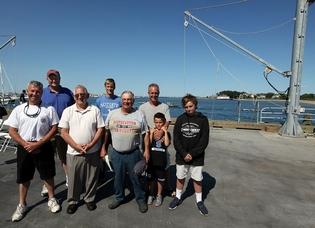 When Frank Mirarchi first came to the town pier in 1949, he was a 6-year-old fascinated by the hustle and bustle of “boisterous rivalry” among a crowd of lobstermen. Over the years, the town has invested in infrastructure to support the industry, including the recent reconstruction of the pier. Meanwhile, federal regulations have had an opposite effect, he said. “The 1987 pier has been given a major upgrade, prolonging its life and utility for yet another generation, but will there be another generation to serve?” he said. Career fishermen, like Mirarchi, joined town officials recently in re-dedicating the newly renovated town pier, which was first built in 1936 and last renovated in 1987. The event was mostly a celebration to honor the fishermen and their families, but the decline of the industry was a natural part of the conversation. Read the story here 13:32
When Frank Mirarchi first came to the town pier in 1949, he was a 6-year-old fascinated by the hustle and bustle of “boisterous rivalry” among a crowd of lobstermen. Over the years, the town has invested in infrastructure to support the industry, including the recent reconstruction of the pier. Meanwhile, federal regulations have had an opposite effect, he said. “The 1987 pier has been given a major upgrade, prolonging its life and utility for yet another generation, but will there be another generation to serve?” he said. Career fishermen, like Mirarchi, joined town officials recently in re-dedicating the newly renovated town pier, which was first built in 1936 and last renovated in 1987. The event was mostly a celebration to honor the fishermen and their families, but the decline of the industry was a natural part of the conversation. Read the story here 13:32
A fisherman’s doubt, and his love of the sea
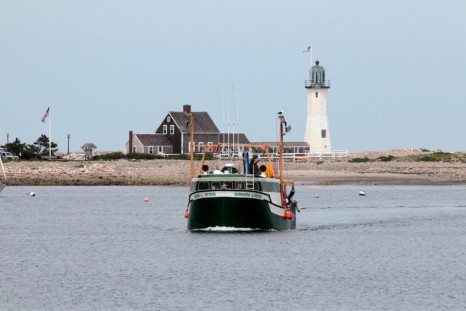 He is up before the dawn, and, a creature of steady habits, he heads for the seashore. It’s dark when Frank Mirarchi jumps into his black pickup truck, and dark still when he reaches Scituate Harbor. He parks on the town pier and stares at the ocean. But his 55-foot stern dragger is no longer moored there. Actually, the boat is there. But it’s no longer his. It was renamed last June after he sold it — a poignant punctuation point to Mirarchi’s half-century career as a commercial fisherman. Read the rest here 15:01
He is up before the dawn, and, a creature of steady habits, he heads for the seashore. It’s dark when Frank Mirarchi jumps into his black pickup truck, and dark still when he reaches Scituate Harbor. He parks on the town pier and stares at the ocean. But his 55-foot stern dragger is no longer moored there. Actually, the boat is there. But it’s no longer his. It was renamed last June after he sold it — a poignant punctuation point to Mirarchi’s half-century career as a commercial fisherman. Read the rest here 15:01
Your View: Electronic at-sea monitoring and the ‘observer dilemma’ – Frank Mirarchi, Jim Ford
 The human monitoring program is outdated, expensive, and in need of an overhaul, but not eradication. Without an effective monitoring program, managers have no idea whether the fish caught and fish discarded are staying under the hard “biologically safe” annual catch limit prescribed by fisheries scientists. If the at-sea program were not eliminated, but instead replaced with electronic monitoring (EM), the entire program would work better for fishermen. Read the rest here 08:14
The human monitoring program is outdated, expensive, and in need of an overhaul, but not eradication. Without an effective monitoring program, managers have no idea whether the fish caught and fish discarded are staying under the hard “biologically safe” annual catch limit prescribed by fisheries scientists. If the at-sea program were not eliminated, but instead replaced with electronic monitoring (EM), the entire program would work better for fishermen. Read the rest here 08:14
Scientists, Fishing Fleet Team Up To Save Cod — By Listening
 In the ocean off of Massachusetts, an unlikely alliance of scientists and fishermen is on a quest. They’re looking for mating codfish. The goal is not only to revive a depleted fish population, but to save an endangered fishing community as well. Frank Mirarchi, a fisherman in the area for 52 years, was one of those who came forward. “We know the fish are spawning somewhere in this fairly large area of several hundred square miles,” he told the scientists. “Help us find out where.” “We’re trying to fish but not catch cod,” says Mirarchi. “That’s the new strategy.” Read the rest here 08:20
In the ocean off of Massachusetts, an unlikely alliance of scientists and fishermen is on a quest. They’re looking for mating codfish. The goal is not only to revive a depleted fish population, but to save an endangered fishing community as well. Frank Mirarchi, a fisherman in the area for 52 years, was one of those who came forward. “We know the fish are spawning somewhere in this fairly large area of several hundred square miles,” he told the scientists. “Help us find out where.” “We’re trying to fish but not catch cod,” says Mirarchi. “That’s the new strategy.” Read the rest here 08:20
Audio Presentation: Eavesdropping on the Private Lives of Cod
 If you want to protect New England’s most iconic fish and still allow fishermen to catch them, it’s critical to know when and where they reproduce. The trouble is, we don’t. It turns out cod and humans may not be as different as you’d think. Chris McGuire, marine programs director for The Nature Conservancy, says cod spawning (a.k.a. baby-making) behavior is a lot like a night club scene. Read the rest here 13:02
If you want to protect New England’s most iconic fish and still allow fishermen to catch them, it’s critical to know when and where they reproduce. The trouble is, we don’t. It turns out cod and humans may not be as different as you’d think. Chris McGuire, marine programs director for The Nature Conservancy, says cod spawning (a.k.a. baby-making) behavior is a lot like a night club scene. Read the rest here 13:02






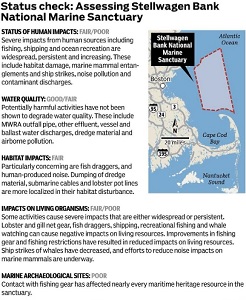
 Thank you for the editorial “White House puts politics ahead of fishery science” published on Tuesday, May 26. You have provided your readers an insight into the utter dysfunction which pervades the government’s management of New England fisheries. By way of background, the Secretary of Commerce declared the northeast groundfish fishery an economic disaster in September, 2012. Subsequently, Congress appropriated approximately $33 million in disaster assistance to be distributed by the National Marine Fisheries Service,,,
Thank you for the editorial “White House puts politics ahead of fishery science” published on Tuesday, May 26. You have provided your readers an insight into the utter dysfunction which pervades the government’s management of New England fisheries. By way of background, the Secretary of Commerce declared the northeast groundfish fishery an economic disaster in September, 2012. Subsequently, Congress appropriated approximately $33 million in disaster assistance to be distributed by the National Marine Fisheries Service,,, 




























